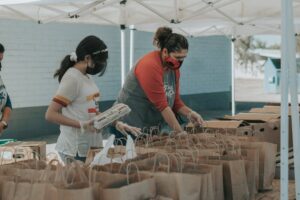Time: 10:00 - 12:30
Venue: Zoom meeting

Photo Ismael Paramo / Unsplash.
Register here to join the DSI-NRF Centre of Excellence (CoE-FS) Food Imbizo, in collaboration with the Dullah Omar Institute for Constitutional Law, Governance and Human Rights, as we explore how developments during the pandemic have shifted the legal and political environment for realising the right to food in South Africa.
Presenters:
Marc Wegerif (University of Pretoria)
Aisosa Jennifer Omoruyi (Dullah Omar Institute)
Marcus Solomon (Children’s Resource Centre)
Panellists:
- Glory Lueong (FIAN International)
- Baone Twala (Section 27)
- Chantell Witten (University of the Western Cape)
- Commissioner Sibanyon (South African Human Rights Commission)
- Charles Simane (South Africa Food Sovereignty Campaign / COPAC)
- Nzama Mbalati (HEALA)
Facilitator: Busiso Moyo (University of the Western Cape)
The right to food is enshrined in the South African Constitution as well as embedded in various international and regional human rights instruments that South Africa has signed up to. However, despite a plethora of food and nutrition-related policies adopted by the government, realising the right to adequate food remains elusive for millions of South Africans, including young children.
This situation worsened during the COVID-19 pandemic. Even after the majority of lockdown measures have receded, food insecurity remains higher than pre-pandemic levels, making it even more urgent that the right to food is realised. In addition, the susceptibility to COVID-19 of people living with non-communicable diseases, such as diabetes, demonstrated the need to pay increased attention to ensuring — not just food on the table — but adequate nutrition for all. At the same time, in July 2020, the NGO Equal Education partnered with the rights-based organisation Section 27 to successfully take the Department of Basic Education to court to demand the immediate resumption of the National School Feeding Programme — setting important legal precedents for realising the right to food.
In light of these and other developments during the COVID-19 crisis, this gathering will reflect on realising the right to food and food justice in South Africa. We will discuss the following key questions:
- What have been the barriers to realising the right to food and food justice in South Africa?
- How have other countries successfully campaigned for their right to food?
- Does the government have an obligation to protect the public by addressing the activities of the food industry?
- What developments during COVID-19 can help us move forward the debate on realising the right to food?
- What are the opportunities for strategic litigation on the right to food in the light of COVID-19?
Register here to join the discussion.
You can access documents from previous meetings on the Food Imbizo website.
Food Imbizo Secretariat
Upcoming Events
Our GOALS
We recognise that producers, processors, distributors and consumers are incorporated into the food system under varying terms and returns. We also recognise the economic, social, human and environmental health impacts associated with food security. Therefore our goal is to conduct research, build capacity and disseminate findings that will promote a sustainable food system in South Africa.
Our MISSION
Our research is concerned with the scale, nature, causes and consequences of food insecurity in South Africa and elsewhere on the African continent. Thus our mission is to investigate products, technologies, processes and policies that can reduce food insecurity and mitigate its negative outcomes. We seek to make a difference to food security by linking innovative science with critical enquiry.



